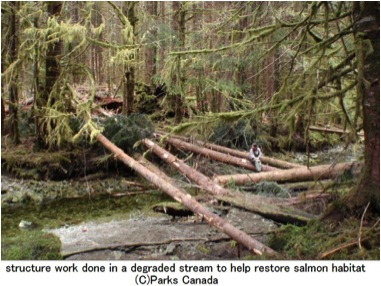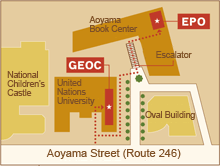Summary
An ecological restoration project on Lyell Island on Canada’s west coast has linked stream and riparian forest restoration with the cultural significance of the area to the indigenous Haida people. The project offers a model for collaborative decision making and management and fosters a sense of connection and long-term support for the protected area through visitor engagement and extensive involvement of younger people in restoration activities.
Prior to its protected area status, Lyell Island had seen extensive logging activity that led to degradation of forest ecosystem function, including damage to stream channels and the loss of suitable spawning and rearing habitat for several species of salmon.
In 1985, elders of the Haida Nation led an historic political standoff on Lyell Island to protest against unsustainable logging on their traditional lands. These protests ultimately led to the 1993 designation of Gwaii Haanas National Park Reserve and Haida Heritage Site and the establishment of the cooperative management model in protected areas management — a unique development at that time in Canada. Today, management decisions about Gwaii Haanas, including those about restoration activities, are made jointly and through consensus by the Archipelago Management Board, which comprises representatives of the Government of Canada (Parks Canada) and the Haida Nation.
In 2009, the Park Reserve launched and initiative to restore degraded streams and adjacent riparian forests to support re-establishment of self-sustaining salmon populations in the islands creeks. The project is not only restoring ecological integrity of the Park Reserve ecosystem but is supporting the traditional and commercial fisheries of the region and reconnecting the Haida people with this important symbol of the Haida struggle to protect their natural and cultural heritage.

Points about the partnership
Haida Fisheries (the fisheries management organization of the Haida Nation), Hecate Strait Streamkeepers and Fisheries and Oceans Canada are key partners in stream restoration and salmon enhancement work. Fieldwork activities, including the building of in-stream structures and monitoring and research, are undertaken by both Parks Canada and Haida Fisheries staff.
One important aspect of the project has been to engage young people in the restoration activities. Programmes developed in partnership with Parks Canada and Fisheries and Oceans Canada aim to raise awareness about the ecological and cultural significance of salmon. School children have been actively involved in projects to learn about the salmon lifecycle, including setting up fish-tanks in classrooms to raise salmon fry from Lyell Island broodstock, and have been involved in releasing the fry into restored creeks. Haida elders and representatives also give talks to school children about the Lyell Island, such as its history, their activities and the management system, for the benefit of future generations.

- By engaging visitors, community members and young people in hands-on ecological restoration activities, the project fosters an increased understanding of the importance of ecological integrity.
- The project highlights the connection of the living culture of the Haida people to the land and sea.
- The Park Reserve’s cooperative management body, the Archipelago Management Board, has provided an institutionalized structure of decision-making that supports consensus building and has enabled stakeholders to develop project goals and objectives that are appropriately grounded in the ecological, cultural and community context of the Haida Nation.
- Robust and productive partnerships with other government agencies has resulted in both efficiencies in project implementation, and has maximized restoration impacts. In particular, strong partnerships with on-island agencies have been fruitful in advancing successful project outcomes.
Theme(s):Forest preservation, ESD/environmental education, Biodiversity/nature conservation
Actor(s):Parks Canada, the Haida Nation, The International Union for Conservation Nature(IUCN)
Partner(s):Haida Fisheries, Hecate Strait Streamkeepers and Fisheries, Oceans Canada, school children
Reference
The International Union for Conservation Nature(IUCN). Ecological Restoration for Protected Areas. P.91-92

















